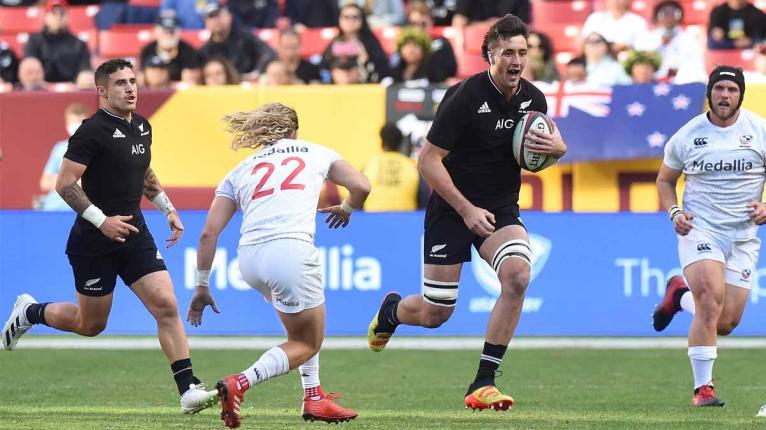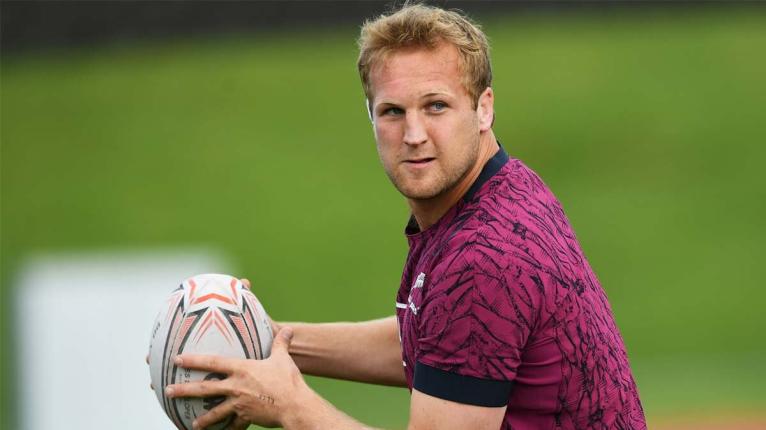New Zealand’s second row pecking order received a bit of a shake-up at the tail-end of last season.
While the upper echelon, comprising Sam Whitelock, Brodie Retallick, Scott Barrett and Patrick Tuipulotu, remained intact, it was the rise of 21-year-old Josh Lord that understandably set tongues wagging.
Here was a man who had made just a handful of appearances at Super Rugby level – and not many more on the provincial scene – earning a call-up to arguably the most prestigious international rugby side in the world for their trip to the Northern Hemisphere.

Lord certainly didn’t make a fool of himself in the test arena, featuring against relative lightweights the United States and Italy, but the goal of the tour was undoubtedly more about getting the young second-rower into the All Blacks environment and getting a closer look at his potential, as opposed to bringing in a ready-made world-beater.
Ian Foster and co will likely take four locks to the 2023 World Cup in France and unless injuries strike, Lord would have to force his way ahead of his Chiefs teammate Tupou Vaa’i before he would even be considered for that flagship event on the calendar. As such, it’s in the seasons following, when Whitelock and Retallick inevitably retire from test rugby, that Lord’s early elevation could pay dividends.
As such, with Barrett and Tuipulotu remaining in NZ for personal reasons for the All Blacks’ end-of-year tour, it makes sense why an ‘apprentice’ lock was selected to accompany Whitelock, Retallick and Vaa’i up north. What is less immediately obvious, however, is why Lord was given the nod ahead of some more experienced options.
In 2020, Quinten Strange earned a call-up to the All Blacks ahead of their Bledisloe Cup matches with Australia after bucking a string of injuries towards the end of the Super Rugby Aotearoa season and putting together some good minutes for the Crusaders, primarily off the bench.
With both Strange and Dunshea having previously earned selection in the All Blacks, many fans were left with a sense of confusion after the pair were overlooked for last year’s northern tour but there was good reason for their omissions.
That feel-good story was quickly curtailed, unfortunately, after Strange suffered another injury just days after getting into camp with the All Blacks. In his place, fellow Crusader Mitch Dunshea joined the team and travelled to Australia with the squad for the Tri-Nations but never had the chance to take the field.
With both Strange and Dunshea having previously earned selection in the All Blacks, many fans were left with a sense of confusion after the pair were overlooked for last year’s northern tour but there was good reason for their omissions.
In Dunshea’s case, the 26-year-old had been ruled out of all forms of rugby for the latter half of the year after opting to undergo neck surgery in early July for a chronic issue.
“Mitch is a quality player, he brings a lot of maturity and skill, he’s been in and around the All Blacks too and he would have brought all that experience to our campaign,” Canterbury coach Reuben Thorne said at the time, “but the right thing for him is to be fit and healthy again and we wish him all the best.”
After featuring 12 times for the Crusaders throughout the 2021 season, making five starts for the Super Rugby Aotearoa champions, Dunshea may well have been the next cab off the ranks ahead of Lord had he not been unavailable for selection.

Strange, meanwhile, was in need of some big minutes after spending much of the Super Rugby season behind Whitelock, Barrett and Dunshea at the Crusaders, only managing a solitary start throughout their campaign.
The Tasman co-captain took the field eight times for the Mako throughout last year’s NPC, amassing 465 minutes of action – more than he’d managed for the entirety of 2020. While the 25-year-old is still a player of immense potential, the All Blacks selectors may well have decided that Strange simply needed to get some runs on the board, instead of spending the latter half of the season holding tackle bags in Europe.
Ahead of the new Super Rugby Pacific season’s kick-off this week, Crusaders forwards coach Jason Ryan has conceded that it will again be a challenge dishing out minutes to the riches of talent the team boasts in the second row.
“I think out of all the positions in the forward pack, the locking position is probably the toughest to pick each week, but the boys know that,” he said.
“We always say it’s one of the hardest forward packs in the country to make. But we’re into game one, there is always opportunities to give other guys a crack. We’ve just got to make sure we’re giving everyone the love, that’s my job, whether they are in the 23 or playing their part and contributing to the 23 getting ready in training.”
Parkinson is perhaps the biggest second-rower in the country, built in a similar mould to Brodie Retallick, and has all the physical attributes needed to be a monster on the world stage.
While both Dunshea and Strange will be quietly hoping to force their way back into the national selection frame this year, simply earning starts for the Crusaders will be a major challenge in itself and although they’ve both managed to catch the interests of the national selectors in the past, a shift away from the region may be the best move for their futures. Both men, however, are signed through with the Crusaders until the end of 2023.
That will likely be Whitelock’s final season with the team and it wouldn’t be out of the question for 28-year-old Barrett to also take his wares offshore, but the most likely scenario is that just one spot will open up in the starting line-up. It could well be too late by then for Dunshea or Strange to force their case for national elevation, however, with the selectors erring towards younger models, all else being the same.
The future is equally cloudy for another fan-favourite, Highlanders lock Pari Pari Parkinson. Parkinson is perhaps the biggest second-rower in the country, built in a similar mould to Brodie Retallick, and has all the physical attributes needed to be a monster on the world stage. So far, Parkinson’s only exposure to international rugby has come in the form of representing the Maori All Blacks, with the 25-year-old also overlooked by the national selectors last year.
Parkinson, like Strange, has been hugely held back by a never-ending run of injuries – the latest which will see him miss the entirety of the Super Rugby Pacific season and probably the bulk of Tasman’s NPC campaign too.

Prior to last year’s end-of-year tour, the wider New Zealand public would have certainly ranked the likes of Strange, Dunshea and Parkinson right below Vaa’i in the national pecking order but Lord’s selection has upset the apple cart somewhat.
Lord isn’t the only talented second-rower in his early 20s around New Zealand, of course. Naitoa Ah Kuoi rounds out an excellent contingent at the Chiefs while Sam Darry and Taine Plumtree at the Blues could both have big futures. Caleb Delany at the Hurricanes is another with big wraps and 19-year-old Highlanders prospect Fabian Holland is another who has all the physical attributes necessary to excel at the highest level of the game. For the players in their mid-20s, such as Dunshea, Strange and Parkinson, it may be a case of now or never.
Josh Lord sprang out of the woodwork last year to earn a place on the All Blacks tour to the USA and Europe and the young lock will be out to prove that call-up wasn’t just a fluke but he’ll be competing with the likes of Brodie Retallick, Tupou Vaa’i and Naitoa Ah Kuoi for minutes even at Super Rugby level.
It’s a similar story across the country with top prospects seemingly having to dethrone proven senior players to really advance their cases for national selection. It’s the kind of situation that could really accelerate young players’ development – but one that could also leave some battered, bruised and spat out by the high-performance system.
Spare a thought for the likes of Mitch Dunshea, Quinten Strange and Pari Pari Parkinson, men who have come so close to earning test debuts for the All Blacks but not quite achieving their goals – and now the younger generation could be passing them by.



Comments
Join free and tell us what you really think!
Sign up for free